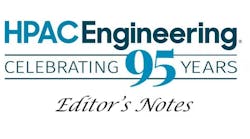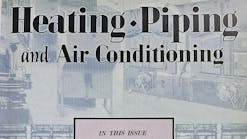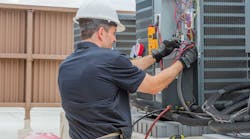If you own or manage an HVAC repair and installation company, it's highly recommended that you protect your business by performing risk management for your HVAC projects.
If anything goes wrong during a project, you or your technicians will likely be blamed, which is why it's best to eliminate the possibility of this happening altogether. Make sure that any risk management plan you develop isn't based on informal conversations but is rather a comprehensive set of guidelines that are written out and clearly understood by your technicians.
Identify Primary Risks
The first thing you should do is identify the main risks that you face while on the job. Whether servicing residential or commercial HVAC units, the risks are largely the same.
For instance, lifting heavy supplies and equipment increases the risk of physical injury. If the supplies fall, more than one technician can be injured. Of course, there is also a risk of being injured while in a confined space. When service techs need to enter a small attic or basement, a lack of space makes it more difficult to maneuver.
Likely the most important risk to manage involves electrical hazards. Even small repairs may require your technicians to handle wiring and circuit breakers. If someone improperly handles the electrical equipment, there's a chance that they could be electrocuted or a could start fire.
Make sure to account for serious weather conditions as well. Installing and maintaining outdoor units can be hazardous when you're working in extreme temperatures.
Assess Your Skills and Capabilities
Before you accept a project, take the time to complete a thorough assessment of your skills and capabilities. Even though a large project promises high profits, you shouldn't take on projects for which you don't currently have the skills. Consider referring the customer to another HVAC technician or company you trust.
If you're getting ready to bid on a project, consider backing out if you believe that you'll have a difficult time completing the work. Not going forward with work you're unsure about can save you ample amounts of time and money. Your reputation would also suffer if you could not finish a job.
Adhere to Regulatory Requirements
While the HVAC industry is governed by codes and regulations that may differ in some areas, the best strategy is to consult applicable guidance from the International Code Council (ICC) and the American Society of Heating, Refrigerating, and Air-Conditioning Engineers (ASHRAE). Those bodies can help you navigate the many safety codes and standards that federal, state and local agencies create and that you need to follow while working on an HVAC project.
If you know what these standards are and adhere to them during a project, it will be more difficult for homeowners or business owners to place blame on you if something goes wrong later on.
Let's say that you perform an HVAC installation for an industrial facility. If the system is not installed correctly or properly to local standards, your customer can justifiably blame you if and when an error occurs. Similarly, the Environmental Protection Agency is tasked with maintaining and enforcing emission standards across the U.S. If your customer's new HVAC unit does not meet these standards, they could be deemed at fault and subject to fines.
Since they had relied upon you to bring them into compliance, they can then turn around and file a lawsuit against you. That will only serve to cost you time and money and damage your reputation.
Obtain Necessary Licenses and Bonds
Before you can work on HVAC projects, you must obtain your HVAC contractor license, which requires passing some exams and obtaining a surety bond. Without this license, any work you do could be illegal, depending on which state you operate in.
Select the Best Subcontractors
When you work as an HVAC contractor, among the most substantial risks to your business is hiring poor subcontractors to work on your project. Keep in mind that a bad subcontractor reflects poorly on your business, which is why you should perform extensive research before making a hire.
When you hire a reliable and skilled subcontractor, you'll build a professional relationship that you can carry forward to future projects.
Research Potential Customers
The risks associated with HVAC projects aren't solely centered around safety issues. There are also considerable risks if a customer chooses not to pay. Understanding how to overcome these challenges is essential for mitigating financial risk.
You should know who your customer is and whether any other HVAC technicians you know have worked with them in the past. If one of your customers is difficult to work with, they could make frustrating requests or avoid paying you when the job is done. If there's good reason to believe that a customer could become a liability during or after the project, don't work with them.
Customers who tend not to pay usually have a bad reputation among other contractors, which is why you should seek this information before starting any job. The most effective way to manage this risk is by drawing up a contract for your customer to sign; this should include information on everything from the payment schedule to the project deadline. If the project is a large one, you can also ask for a security deposit upfront if the project.
While you cannot eliminate every risk associated with an HVAC project, risk management allows you to reduce the potential for injury, high expenses, and harm to your reputation. It is well worth your attention.
##########
About the Author
Based outside Philadelphia, Robin Kix is a Renewal Manager for Lance Surety Bond Associates, Inc., which she joined in 2014. Since then, she has helped thousands of U.S. businesses to remain compliant at the federal, state and local levels. Kix has significant experience supporting commercial bond lines, particularly in the automobile, transportation and construction industries.









